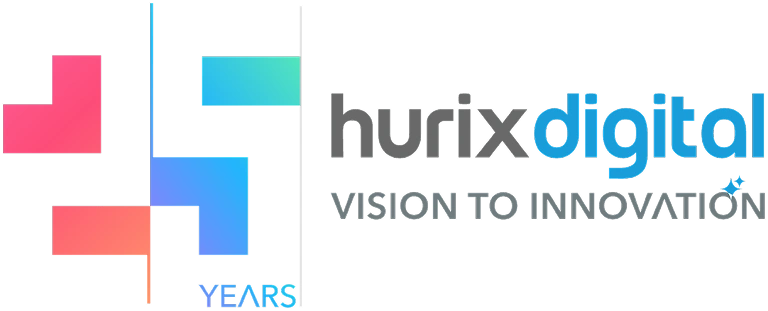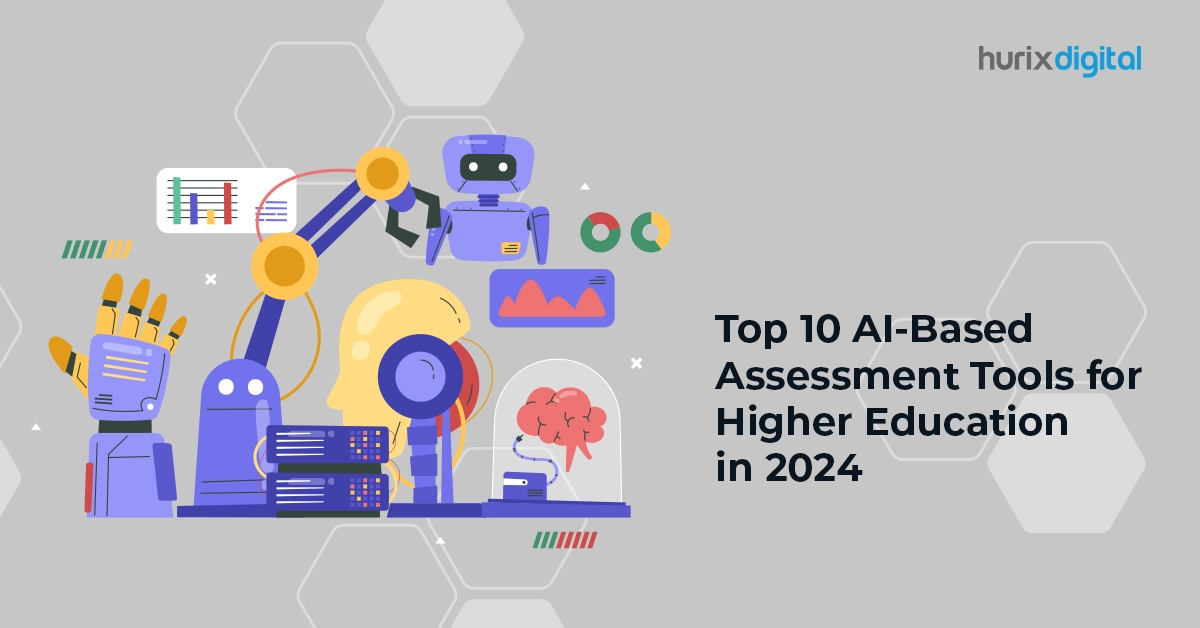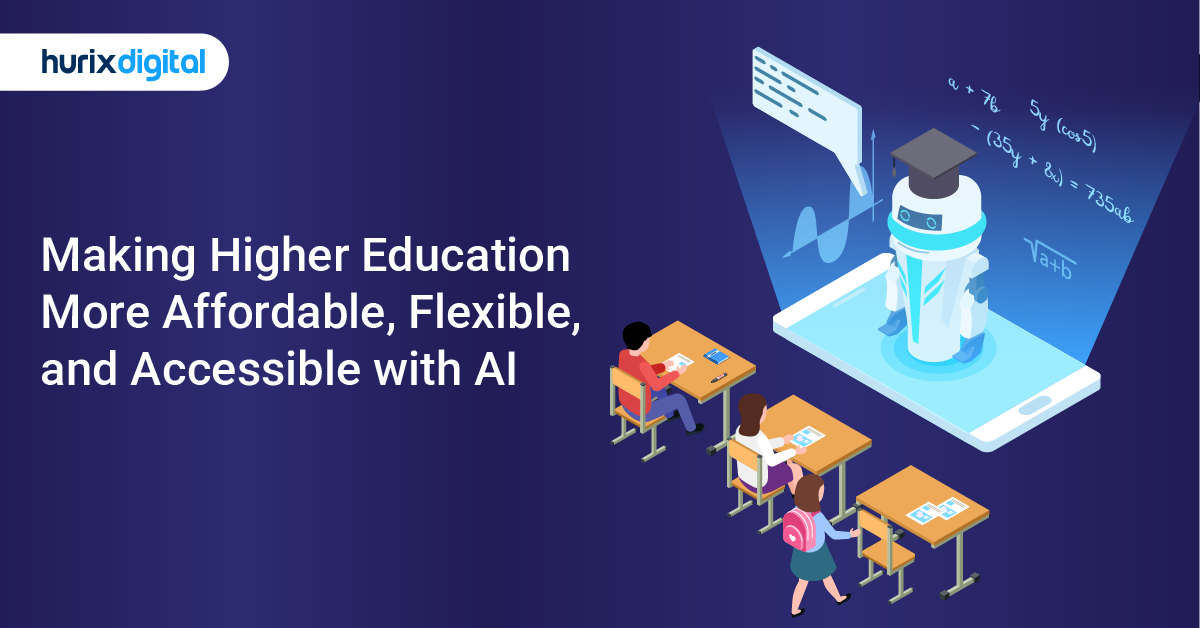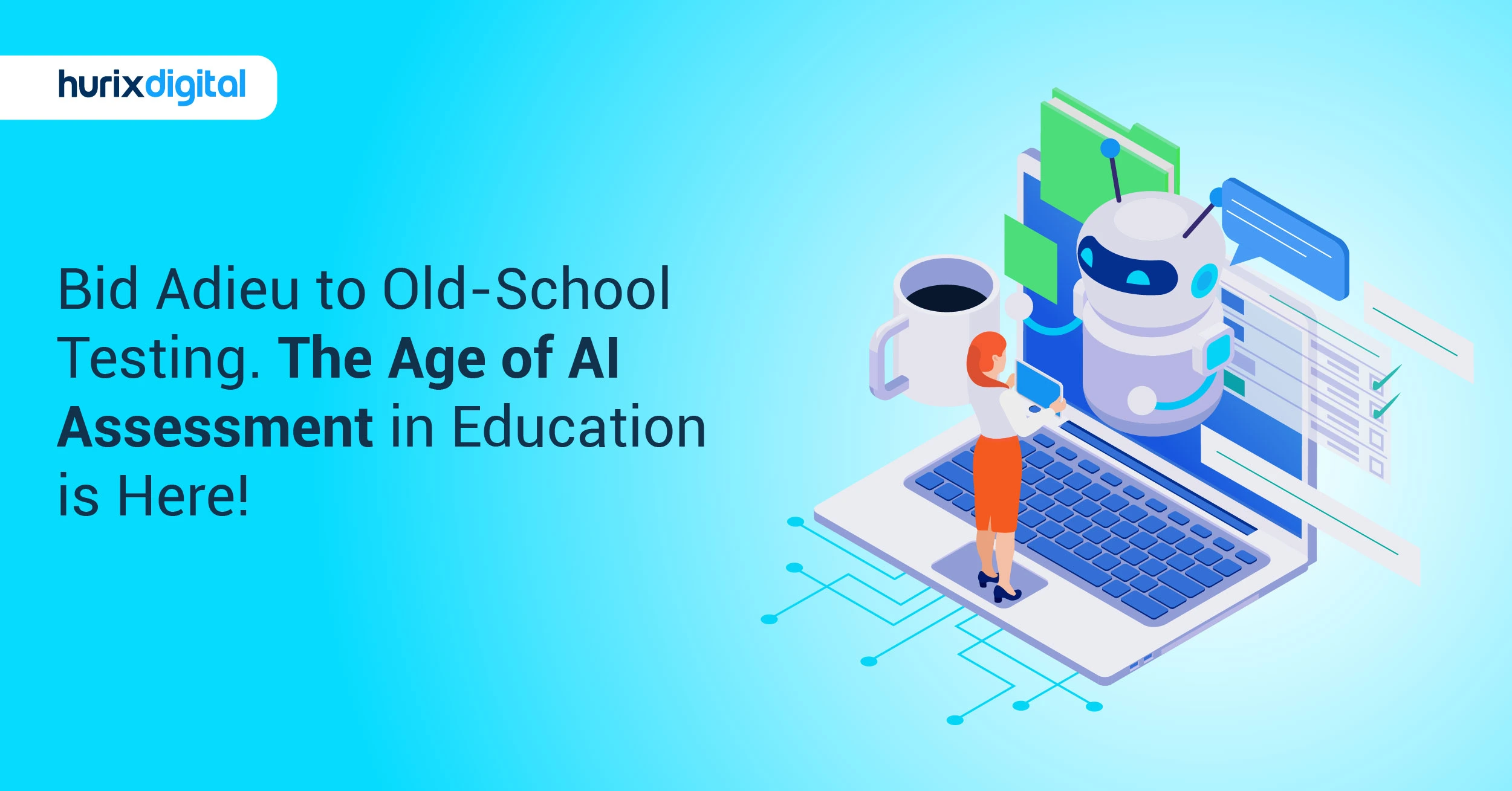
Bid Adieu to Old-School Testing. The Age of AI Assessment in Education is Here!
Summarize with:
Integrating technology in every sphere of life is the need of the hour. Technology has enhanced educational higher learning practices for both students and educators. AI has personalized higher education curricula, automated university administrative tasks, driven data-oriented insights, enabled AI assessment in education, and offered interactive learning experiences.
The advent of artificial intelligence has also transformed assessment tools in higher education. It has revolutionized the traditional methods of evaluating student performance and improved the educational experience. Today, according to research, AI tools are helping teachers spend 70% less time assessing and grading assignments.
Let us understand the ethics of AI grading and assessment in this guide!
Table of Contents:
- What is AI in Assessment?
- The Evolution of AI-Powered Assessments and Grading
- Challenges of Traditional Grading Systems
- The Importance of AI in Assessment and Evaluation
- How Does AI in Assessment Work?
- What are the Uses of Artificial Intelligence in Educational Assessment?
- Developing Authentic Assessment Tasks
- AI Assessments – A Game-Changer in Grading
- Future of AI Assessments in Education
- Takeaway
What is AI in Assessment?
AI can assist educators in developing personalized lesson plans and assessments that align with each student’s strengths and limitations by analyzing student performance and preference data. This can improve student experiences and motivation, eventually boosting academic performance.
For example, Artificial Intelligence (AI) can improve learning through assessment because of its Natural Language Processing (NLP) capabilities. Natural language processing (NLP) makes better voice recognition possible for language learning. This means that oral evaluations can assess a student’s word pronunciation, grammar, and syntax.
The Evolution of AI-Powered Assessments and Grading
Today, educators don’t have to spend hours checking loads of essays or student performances. Educational technology has leveraged AI-powered grading systems that can now evaluate various factors and provide quick feedback to students. These systems work quickly and precisely and help educators identify patterns and trends.
It has been projected that the role of AI in the education market will increase from $3.99 billion in 2023 to $5.57 billion by the end of 2024. It has also been forecasted that by 2030, AI will score 50% of higher education essays and multiple-choice examinations.
AI grading systems eliminate human biases and ensure a fairer evaluation process. Automated assessments use advanced natural language processing techniques to analyze student performances and offer constructive feedback for improvement.
Challenges of Traditional Grading Systems
Traditional grading methods have several challenges:
- Human graders often bring personal biases into their evaluations. This can result in inconsistent and unfair assessments.
- Manually grading large volumes of assignments is time-consuming. This diverts time from more valuable educational activities such as personalized student support.
- Conventional assessment techniques often provide limited feedback. This can impact the student’s ability to understand their mistakes.
The Importance of AI in Assessment and Evaluation
AI’s role in assessment and evaluation can instantly measure student performance and program effectiveness.
AI-powered assessment tools automate grading, provide instant feedback, and personalize questions to individual students’ skill levels. This approach offers valuable insights into student performance trends. Here is how AI assessment in education helps:
- AI enhances broader educational contexts such as program effectiveness, teaching quality, and institutional accreditation.
- AI offers authentic automated assessments where students apply knowledge to real-world problems. This approach promotes higher-order thinking skills and practical application.
- AI grading can help students demonstrate their skills and knowledge through presentations, simulations, and creative projects.
- Authentic AI-based assessments allow educators to support individual learning needs.
How Does AI in Assessment Work?
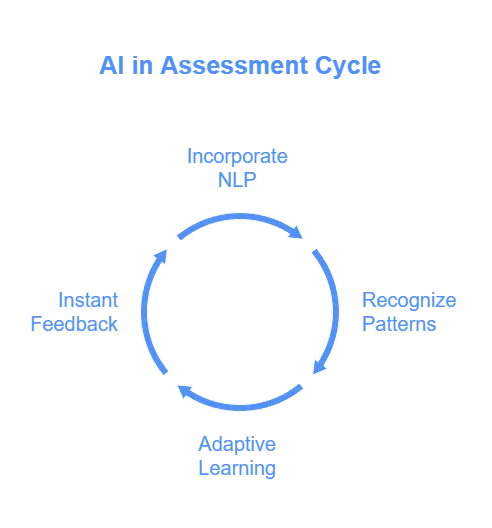
The integration of AI grading in educational technology has improved the assessment using the following techniques:
1. Incorporating Natural Language Processing
AI uses NLP algorithms to interpret written responses. AI grading assesses student answers’ quality, coherence, and relevance and gauges their understanding.
2. Recognizing Patterns and Trends
AI assessment in education identifies patterns in student responses. This helps educators detect common mistakes and misconceptions and offer targeted teaching adjustments.
3. Adaptive and Inclusive Learning
These systems analyze extensive student data and offer personalized feedback after addressing individual learning gaps.
4. Generating Instant Feedback
AI algorithms produce detailed feedback for students. This saves educators’ time and provides students with actionable insights.
What are the Uses of Artificial Intelligence in Educational Assessment?
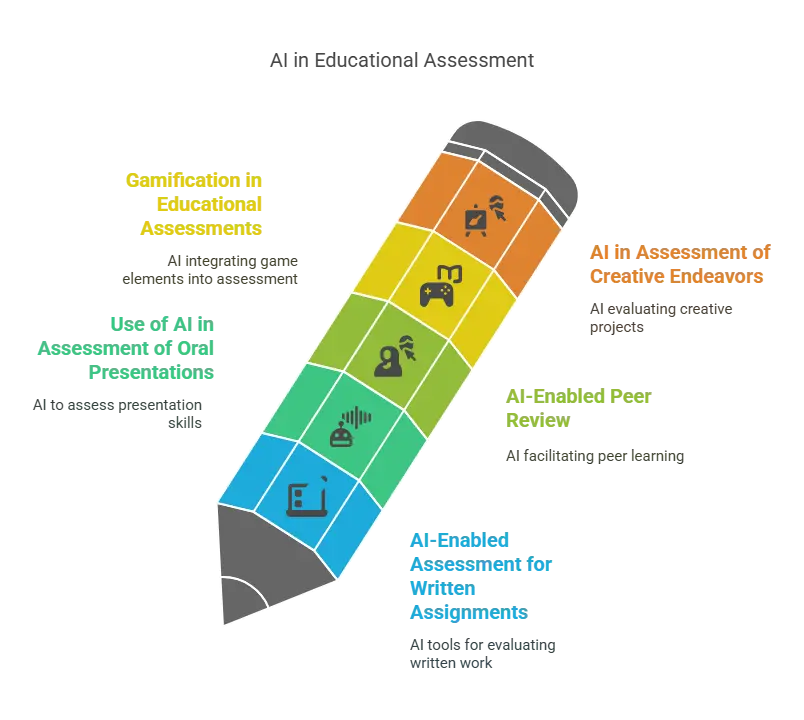
Thanks to artificial intelligence, the assessment of student work in higher education could undergo an enormous transformation. Here are a few ways in which AI in educational assessment is helping to unlock the potential of learners by providing effective and actionable feedback.
1. AI-Enabled Assessment for Written Assignments
Educational institutions can implement AI-driven grading systems for written assignments. These systems can be remarkable in accuracy and give students personalized feedback.
Natural language processing (NLP) models allow for the analysis of essay language, structure, coherence, and argument quality. Cutting-edge language models such as ChatGPT can significantly improve written assignment evaluation and speed up and improve the grading process in educational organizations.
2. Use of AI in Assessment of Oral Presentations
AI in higher education can be used to evaluate oral presentations. This can produce objective evaluations and helpful feedback for students and instructors alike.
The AI system can assess student oral presentations based on content, organization, and clarity. The system analyzes verbal and nonverbal signs, including tone, tempo, and body language, utilizing machine learning and speech recognition tools to provide valuable insight into presentation skills.
3. AI-Enabled Peer Review to Enhance Mutual Learning
By using AI algorithms to expedite and enable peer assessment, learners can improve the caliber of their work and benefit from mutual learning. The AI system will pair them sensibly for peer review based on each student’s abilities, shortcomings, and goals. It can also offer advice on how to give constructive criticism.
The AI can also monitor the feedback’s accuracy to ensure it is pertinent, precise, and useful.
Additionally, Artificial intelligence-driven peer review tools can assist students in developing the critical thinking, interpersonal interaction, and teamwork skills necessary for achievement in higher learning and beyond by helping them through peer evaluation and pointing out instances in which their input needs to be improved.
4. Gamification in Educational Assessments
One intriguing concept that has gained traction is the application of AI-enabled gamification to educational assessment. Gamification and AI in educational assessment can be combined to improve the learning process further.
Together, these two technologies function quite well. For example, adding leaderboards and other forms of acknowledgment and challenge makes using the AI evaluation methodology much more interesting and competitive for students.
AI is crucial to this process since each evaluation, which relies on the learner’s most recent performance, allows for much room for revision. This method accelerates the pace of learning and creates a stimulating and engaging learning environment.
5. Incorporating AI in the Assessment of Creative Endeavors
AI can assess artistic, musical, or design endeavors using sophisticated algorithms examining several aspects of the work. AI systems can objectively evaluate visual art’s uniqueness and aesthetic appeal by examining motifs, colors, forms, and other characteristics.
For instance, in music, AI can evaluate a composition’s inherent inventiveness and excellence by analyzing its melody, coherence, beat, and orchestration.
Similarly, AI systems can assess a design’s usefulness, aesthetic appeal, and adherence to design guidelines. AI-powered evaluation systems can assist students in improving their abilities in various areas and foster their creative potential by offering customized feedback depending on the particular creative realm.
Developing Authentic Assessment Tasks

Authentic assessment tasks require students to perform. Some examples are:
1. Student Demonstrations
Students can engage in activities like experiments, story writing, model creation, and play performances, which allow them to showcase their skills and interests.
2. Student Collaboration Tasks
Group projects that require teamwork, role assignments, and regular meetings have every student contributing to a collective outcome.
3. Empirical Research
Students collect data through interviews, observations, and focus groups. They can later present their findings and case studies with supporting evidence.
4. Presentations
Activities like panel discussions, seminars, and debates can be assessed. These activities require preparation and higher-order thinking.
5. Creative Projects
As part of the automated assessment structure, students can demonstrate knowledge by watching documentaries, podcasts, videos, and other media.
6. Role-Playing
Creative representations of learning through various performance mediums help educators gauge their confidence levels and understanding of core subjects.
AI Assessments – A Game-Changer in Grading
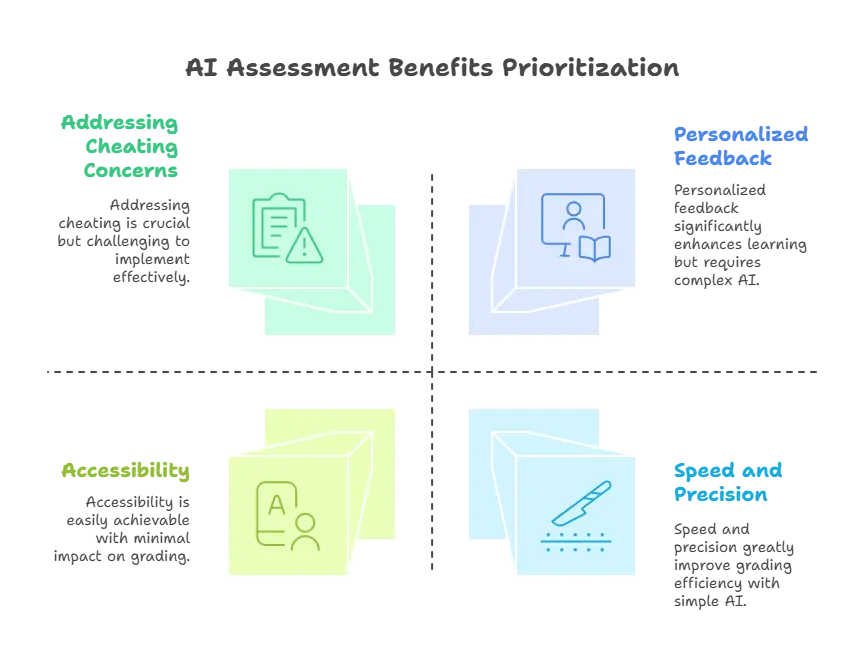
The advent of artificial intelligence has revolutionized educational technology and exam grading. AI-powered automated grading systems offer several advantages that can transform education.
1. Speed and Precision
AI-powered grading systems significantly speed up the grading process.
Tasks are quickly monitored and evaluated, which allows students to receive prompt feedback.
2. Impartial Evaluation
AI grading systems eliminate human biases. This means fair, transparent, and objective assessments.
AI adheres to algorithms and criteria, ensuring that every student’s work is thoroughly evaluated without prejudice.
3. Consistency
AI-driven grading systems handle large exams efficiently while maintaining consistent assessment standards.
This scalability eliminates the variability that can be seen with multiple human graders.
4. Personalized Feedback
AI’s true strength lies in providing personalized feedback. AI assessments analyze individual student responses and identify individual strengths and weaknesses.
This feedback on such findings helps students focus on areas needing improvement.
5. Gamification of Assessments
AI enables innovative assessment methods, such as using natural language processing to create novel questions and hypotheses.
Gamification elements, such as challenges and interactive content, enhance engagement and encourage continuous learning.
6. Accessibility
AI assessments offer enhanced accessibility, work in remote environments, and accommodate diverse styles and abilities.
AI-driven assessments can enhanced by using visual aids and interactive elements, which ultimately makes learning more inclusive.
7. Automation
AI automates the assessment process and reduces human intervention. This automation saves time and allows educators to focus on other important education-related tasks.
AI tools curate assessments, evaluate performance, maintain scores, and deliver results efficiently.
8. Variety in Assessment
AI facilitates diverse evaluation methods, catering to different learning styles and preferences.
AI offers a versatile and accurate assessment package, from automated grading of objective questions to analyzing multimedia submissions and real-time problem-solving through simulations.
9. Addressing Cheating Concerns
AI can mitigate cheating by generating personalized tests for each learner, rendering leaked questions irrelevant.
AI ensures exam integrity by creating unique assessments for every student. Additionally, AI-driven assignments that require higher-order thinking skills and real-world applications discourage cheating and promote genuine learning.
Future of AI Assessments in Education
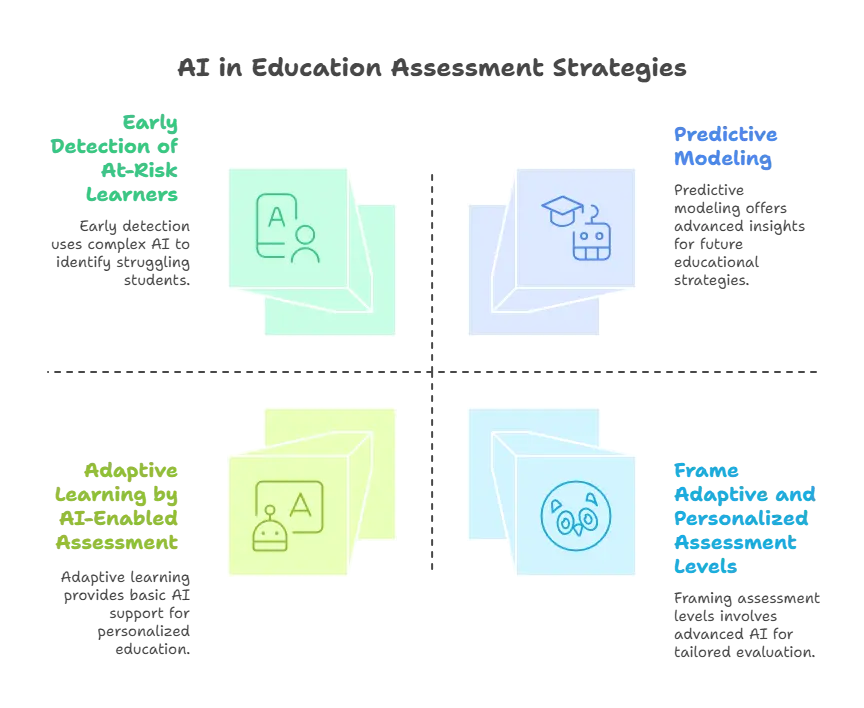
While the use of AI in educational assessment is garnering popularity worldwide, many significant aspects have yet to be explored and made actionable. Here are a few examples of the future scope of AI in assessment.
1. Potential of Adaptive Learning by AI-Enabled Assessment
To create adaptive learning programs that can aid students in learning with greater effectiveness and efficacy, AI algorithms can evaluate data on students’ previous performance.
AI in educational assessment may forecast which sort of assignment could result in focused learning for the pupil by looking at their hobbies, memory retention, job completion percentage, or a range of other data points.
2. Early Detection of At-Risk Learners
Artificial intelligence (AI) systems can analyze data on attendance, grades, and other variables to identify students who risk falling behind in their studies or quitting altogether. This can assist educators and administrators in stepping in early to offer assistance and keep pupils from getting lost.
3. Frame Adaptive and Personalized Assessment Levels
Using data from students’ answers to assessment questions, AI algorithms can modify the next question’s complexity level, ensuring that every student is properly encouraged to perform the best and evaluated accordingly.
4. Predictive Modeling
AI systems can create predictive models that pinpoint variables that are prone to success or failure using data on previous student performance. This can assist educators and administrators in making data-driven decisions to improve educational results.
Takeaway
AI in educational assessment presents chances to improve efficiency, deliver prompt feedback, customize learning, and better understand student performance and learning objectives.
AI assessment in education enhances efficiency, fairness, and personalized learning. As AI educational technology evolves, its role in education will expand, embracing innovations and providing a more engaging educational experience. AI grading empowers students to reach their full potential.
If you are looking for AI-powered educational assessment tools for your educational organization, contact Hurix Digital. Our evaluation tools provide an enjoyable learning atmosphere that inspires and involves students.
Additionally, it provides educators with significant insights into their learning habits through actionable data. Using these online tests, students can also examine themselves, determine how well they performed, and make improvements.
Get in touch with us today!
Summarize with:

Chief Learning & Innovation Officer –
Learning Strategy & Design at Hurix Digital, with 20+ years in instructional design and digital learning. She leads AI‑driven, evidence-based learning solutions across K‑12, higher ed, and corporate sectors. A thought leader and speaker at events like Learning Dev Camp and SXSW EDU
 A Space for Thoughtful
A Space for Thoughtful 